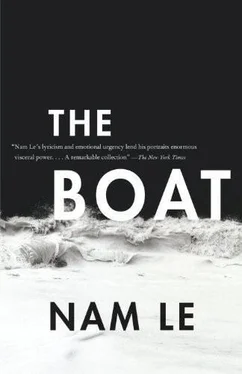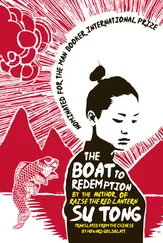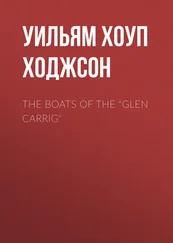If you do not trust in my ability, I say, I can go away. My voice sounds like a series of echoes inside my head. You can take my salary for this month as compensation.
That is generous of you, Ron. Perhaps I will return the favor and give it to your mother.
He has not taken his eyes from me. I say to him, I am a soldado . You said this. There is no reason to involve my mother.
We look at each other. On the desk between us a thick candle sputters in a sudden draft, but neither of us blinks. His eyes are black puddles.
A bell rings in the outside darkness. I cannot hold my eyes to his — I look away. Everywhere I look are the flames of candles. It is truly like the inside of a church, I think, although I cannot remember having been inside one for years. My head feels humid. I look at El Padre again and realize I no longer know the words to any prayers. Hail Mary, full of grace, I think, but after that my mind is as dark as an empty barrel. I wonder if the stories are true. I wonder where he conceals the knife. I wonder if he will ask me to turn my back to him, or if he will come to stand behind me.
***
HERNANDO WAS READING THE NEWSPAPER over an evening meal as I watched from my concealed position, behind a thick shrub, in his backyard. Four days ago. My Glock loaded and ready. I watched him for a long time before coming in. When he saw me his face was grave with surprise, his eyes blinking down and up from the gun. Then he stood to embrace me.
They sent you? he asked quietly.
I nodded.
And?
He looked at me, calmly, as though I were a brother he had grown up with every day of his life. He looked at me as though he already knew what I would say. I wondered whether he knew better than me what I had been thinking as I stood outside in his yard, underneath the warm, polished leaves, testing the trigger in the half dark.
I told you, I said. I told you.
He smiled. My fingers tightened around the Glock. I looked at his forehead. Then, as though following a separate will, my hand lowered the gun to the table, let go of it.
Run.
I was not sure if I said it aloud or merely thought it.
His smile froze. Run?
He will send others. You must go. Now.
What of you?
I did not know. I had never thought it would happen this way. My mind was still clear — as it was whenever I did the business — but before the broad calm of Hernando's look I could feel the clarity slipping away.
He asked, Are you sure? After a while he frowned, then said abruptly: Come with me.
He nodded, as if it had been I who had made the suggestion, then nodded again, more vigorously, saying to himself, Yes, yes. But where? Far away. The coast. North is better. Cartagena. Come with me to Cartagena. We will be fishermen. He laughed aloud. After all this! he said.
Cartagena?
Yes, he said. Why not? He spoke playfully now, as if we were kids again, as if we were in one of our mocos and bragging to each other about our day's score.
I cannot go, I said.
I will not go without you, he said. When I brought my eyes to his I realized he was serious.
Even then, I understood the consequences. He was my brother but I owed him nothing — he knew that. I had not seen him for three months. He knew I had come in from the streets and — like them — had promised nothing, was incapable of betrayal. He laughed, and as I watched him laughing, his face made childlike in the act, I suddenly saw a glimpse of the old Hernando and in that moment I realized how completely he had left that person behind. I remembered him tall and bronze-skinned, then handing me the gun on the hill, then weak-kneed and pale, and now as I watched him his face was again new. It was unlike any of the faces I had seen in their last moments — always too tight or too loose — his was settled somehow, clear of weakness, the face of a soldado ready to die — for what, I did not understand — but whatever it was, I knew then it was not mine to impede. I would let him go. I thought of El Padre. I thought of my mother, and of Claudia. I thought of Cartagena and wondered how many times a person could start over. After a while I started laughing as well.
Yes, he said again. Yes, yes. He paused, his face sly: Claudia likes Cartagena.
Fishermen, I said.
Yes, he nodded, grinning widely. Do you remember how Luis described it?
I brought my hand to my mouth, tapped my teeth with my fingernail. This sent Hernando into a renewed fit of laughter. We were like two drunken schoolgirls. Do I remember? I said. Only after the fortieth time.
***
AFTER A LONG SILENCE, El Padre sighs, his breath fluttering the candle flames on his desk, then smiles with his mouth and says:
You are right. You have been a good soldado .
I do not say anything. He leans back in his large chair and clasps his hands behind his neck. Even the darkness of his armpits somehow suggests violence. Hail Mary, full of grace…
When I was your age, he says — even younger — I too had to eliminate my friends. He pauses. His voice has changed; it is softer now, damper. I did not mark your friend as a hit, he says. But I chose you to make the hit.
I bow my head, not knowing what to say. I remind myself that, of course, I already knew this. I think of the World Cup story, and wonder distantly if El Padre's face looked then as it does now: like a gangster in an American music video.
He continues speaking. As he speaks, it seems that his words harden into deep noises. Afterward, he says — he is saying — afterward, I learned to not care so much about the death-only the details. Death is just a transaction. A string of consequences.
I nod. I am becoming heavier. His words are weighing me down. My body is a rock in this chair.
Take me, for example, El Padre says, looking at me carefully. If I die, do you know how many deaths will follow? He tells me the number. I do not know whether he is saying it with pride or sorrow or disbelief.
But part of me is capable of thinking that this is an extraordinary thing. That one life can hold so many others up. That the other lives can be ignorant of this. It reminds me of a game of wooden blocks I used to play with my parents, where the push of a single piece could bring the whole tower crashing down.
El Padre watches me and I watch him back, and when the realization comes through the hot swamp of my mind it comes with no satisfaction. You are no Hernando, a voice says in my head, and at that moment I know it to be true. Then another voice says, You are no El Padre. And as it speaks I watch him — this man sitting in front of me with a head of gleaming corn-rows, in this warm atrium of candles — I watch him, in control, alive, and absolutely alone in a power he cannot share.
I understand, I say.
You have been a good soldado , he repeats. He takes a deep breath. You understand that you cannot continue in your job, however?
Yes.
And I will require the weapons back.
Of course.
I will send Damita to tell your friend who waits in the alley. She knows where they are?
I pause. Hail Mary. Then I say, I must tell my friend myself or she will not go.
He watches me impassively.
The weapons are at our moco , I add.
He thinks, and then nods. Then go with Damita, he says. To the alley — no farther. And come back afterward for a drink.
In the front yard outside, before we reach the gate, Damita says, He likes you.
I laugh shortly, the first time tonight. There is something about the coolness of the air that brings me back closer to myself. It is almost over, I tell myself.
No, he does, she says. I can tell. He always acts that way, the first time. She gives me a sidelong look. Her face is the kind they put on the cover of shiny magazines. The first time I met him, ay! I heard the same speech! If two women fight, I shave their heads , she mimics, then laughs, a quick darting laugh that makes me imagine sparks from a fire racing into a night sky.
Читать дальше











